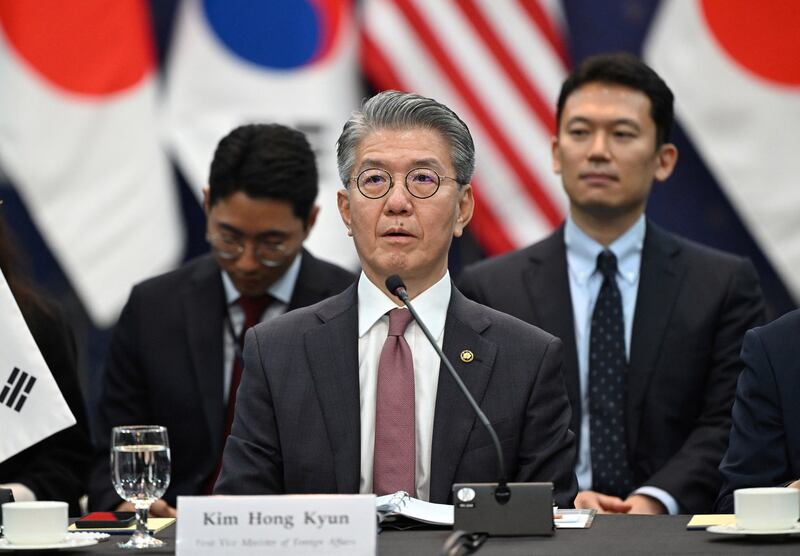Eleven countries, including the United States, South Korea and Japan, will launch a new joint body to monitor North Korea sanctions violations, the South’s foreign ministry said.
The decision follows the dissolution of a U.N. monitoring body six months ago due to a veto from Russia.
The new body, called the Multilateral Sanctions Monitoring Team, or MSMT, aims to ensure accurate and ongoing reporting on the implementation of sanctions against Pyongyang, the ministry said Wednesday.
Members include the U.S., South Korea, Japan, France, the United Kingdom, Germany, Italy, the Netherlands, Canada, Australia and New Zealand.
“Our government will closely cooperate with participating countries to ensure that the MSMT will serve as a major monitoring mechanism to enforce U.N. Security Council sanctions on North Korea,” said First Vice Foreign Minister Kim Hong-kyun, announcing the launch of the framework at a press briefing.
“The MSMT is open to additional participation by other countries that are committed to the robust implementation of the sanctions,” Kim said.

The new body serves as a successor to the U.N. Panel of Experts on North Korea, which was disbanded in April, but it operates outside the U.N. framework and thus does not report directly to the U.N. Security Council, or UNSC.
The term of the UNSC expert panel, which had overseen sanctions enforcements against North Korea since 2009, expired at the end of April after Russia vetoed the annual renewal of its mandate in March. China abstained.
At that time, Russia’s move was heavily criticized, with the U.S. calling it a “self-interested effort to bury the panel’s reporting on its own collusion” with North Korea.
Since then, the U.S., South Korea and Japan alongside other countries have been working to apply different methods to continue sanctions monitoring, with the U.S. ambassador to the U.N. saying they are exploring “some creative ways” and “out-of-the-box thinking” to ensure the continuation of monitoring activities.
The U.S. and its allies have speculated that Russia has already violated multiple international sanctions on North Korea through arms transactions, which intensified following a major military agreement signed with Pyongyang in June.
RELATED STORIES
[ US warns of Russia-North Korea refined petroleum tradeOpens in new window ]
[ 50 UN members eye alternative to disbanded North Korea monitoring panelOpens in new window ]
[ Russia’s veto on North Korea sanctions watchdog sparks international criticismOpens in new window ]
‘Hostile state’
On the same day, the vice foreign ministers of the U.S., South Korea, and Japan met in Seoul, where they discussed ways to step up coordination in response to North Korea’s provocations.
North Korea blew up the northern sections of two inter-Korean roads, the Gyeongui and Donghae roads, Tuesday, following its earlier announcement that it would cut all roads and railways linked to South Korea and reinforce its border.
On Sunday, North Korea said it had ordered its artillery units along the border to be fully prepared to open fire, citing threats from the South.
The North has also accused South Korean drones of dropping anti-regime leaflets over its capital Pyongyang on three separate occasions earlier this month, a claim that the South Korean military has said it cannot verify.
On Thursday, North Korea announced that its constitution clearly defined South Korea as a “hostile state,” the first time Pyongyang has confirmed the basic law had been revised in line with leader Kim Jong Un’s order to codify the South as an enemy, not a partner for reconciliation and unification.
The announcement came after the North convened a key parliamentary meeting last week to revise its constitution. It was not immediately clear whether the term “two hostile states” was included in the revision or if lawmakers removed unification-related clauses in line with Kim’s order.
The North Korean leader already described inter-Korean relations as those between “two states hostile to each other” during a year-end party meeting last December, adding that reconciliation or unification with South Korea was no longer a goal.
Under a 1991 inter-Korean accord, also known as the Basic Agreement, relations between South and North Korea were defined as a “special relationship” tentatively formed in the process of seeking reunification, not as state-to-state relations.
Edited by Mike Firn.
